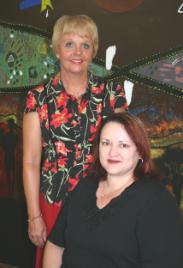'Learning behind bars' research awarded
Published on 11 December, 2008
CQUniversity Rockhampton staff members Vicki Pascoe and Kylie Radel have been recognised for their research study of Education Journeys from Australian Indigenous Students in Custody.
Their academic paper entitled 'What are Nice Guys Like them doing in a Place Like that?' has been selected as the winner of an International Award for Excellence in the area of literacy and education.

Vicki Pascoe (rear) and Kylie Radel
The award was decided by the editors and International Advisory Board of the international Common Ground Publishing network, based in America.
The paper was selected from the 10 highest-ranked papers emerging from the referee process.
As winners, the academics have been invited to attend the upcoming Sixteenth International Conference on Learning to be held at the University of Barcelona, Spain from July 1-4 2009. They will be formally acknowledged in a short presentation.
"Our paper is based on a qualitative research study which explored the education journeys of 6 of our Indigenous CQUniversity students," the academics said.
"Our students represent a fragile equity group, that of Australian Indigenous men in custody. Against the exploration of education journeys, we critically access the possibility of transformational emancipatory education dimensions."
The findings include:
- Most of our participants began their institutionalisation in ‘boys' homes prior to entering adult prison
- All participants were from low socio-economic backgrounds
- All had experienced disrupted home and education environments
- Most participants experienced violence in the home
- Participants expressed high aspirations for family and community, not necessarily for themselves
- All but one participant expressed feelings of education failure
- Motivations to study are not necessarily linked to learning
"Our findings demonstrate that transformational emancipatory education in a prison context is impeded by past education experiences, a restrictive environment and a self-depreciation spiral," the academics said.

